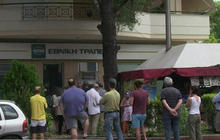Mayor Bill de Blasio: Thank you so much. Thank you. I want to thank Luis Garden Acosta for his extraordinary leadership. I’ve known Luis now a quarter century –
Luis Garden Acosta: At least.
Mayor: – and you are one of the great progressive activists in this city. Let’s thank Luis for all he is doing.
[Applause]
We have come here today as Americans, we have
come here today as New Yorkers to stand up for Puerto Rico, to stand up
for our brothers and sisters – people who we care about so deeply
because we feel such a strong personal tie, all of us, to the island of
Puerto Rico and its people.
We know that three-and-a-half million of our
fellow citizens are right now threatened by a crisis – a crisis largely
created by mistakes of federal policy that now has to be corrected by
federal action. If the federal government doesn’t step in, it will be
abandoning three-and-a-half million Americans who are only asking for
fairness at this moment.
They are saddled with a debt they cannot pay.
They are unable – by law, unable to file for bankruptcy. And they are at
the mercy of their creditors. This is an unacceptable situation. It’s a
catch-22 if we’ve ever seen one.
And I have the honor of representing many
hundreds of thousands of Puerto Ricans here in this city, a city that
would not be as great as it is were it not for the contributions of the
Puerto Rican community, and a city that feels our connection to Puerto
Rico as part of our everyday life – the depth of the connection just
can’t be fully expressed.
So we see our brothers and sisters in trouble, and it’s our job to speak out and not leave them to fend for themselves.
There are more Puerto Ricans living in this city
than any other single place in this nation outside of Puerto Rico
itself, so it’s my obligation to stand up for them – and I know my
colleagues here feel the exact same thing.
You have leaders here – elected officials, labor
leaders, faith leaders, community leaders – all agreeing, all in common
cause that we have to give Puerto Rico the tools it needs to weather
this storm – and only the federal government can do that.
I want to thank all who are here. I want thank
Council Speaker Melissa Mark-Viverito, who has stood up early and often
and powerfully on this issue. I want to thank Scott Stringer, our
comptroller; Tish James, our public advocate. There’s absolute
singularity of purpose among us to stand up for Puerto Rico.
I want to thank Bronx Democratic leader and
Assembly Member Marcos Crespo, Senator Gustavo Rivera, Assembly Member
Carmen Arroyo.
I want to thank the activists – people who really worked to make sure that this issue gets to the forefront and stays there.
I want to thank Frankie Miranda of the Hispanic Federation.
I want to thank my special advisor, another friend of a quarter-century, Arnie Segarra for his good work.
And labor is represented – I particularly want to thank George Miranda, the president of the Teamsters, for joining us.
A lot of people care and we will not stop until the federal government acts.
Now, let’s be clear – it’s the federal
government’s obligation to act, because they can’t stand idly by and
watch Puerto Rico fail, especially because its circumstance has so much
to do with decisions previously made by the federal government.
There is a path to resolution.
Pass HR-870, the Puerto Rico Chapter 9 Uniformity Act.
It simply allows Puerto Rico to restructure its
debt to do what so many other governments and so many corporations have
done in their times of trouble.
If we don’t do it, Puerto Rico simply can’t get back on its feet.
We’re obligated because we as Americans believe
we’re supposed to help our fellow Americans in times of trouble – and
this is a time a trouble if ever there was one for Puerto Rico. It’s no
different than a natural disaster. We must be there for the people of
Puerto Rico.
It’s a tradition that we believe in as Americans.
It’s certainly a tradition we believe in as New Yorkers. And we know
that if Puerto Rico is allowed to fail, it will hurt this entire nation
and be a tremendous injustice to the people of Puerto Rico.
So we stand together in solidarity today and we
will keep making our voices heard to all our federal officials until
there is fairness and action for Puerto Rico.
Very quickly in Spanish –
Puerto Rico
está enfrentando un problema financiero muy serio. No podemos dejar a la
comunidad boricua abandonada en un mar de indiferencia. Como alcalde de
la ciudad con la población de boricuas más grande fuera de la isla, le
pido al Congreso que apruebe una ley que permita a Puerto Rico
reestructurar su deuda. Puerto Rico tiene un lugar importante en los
Estados Unidos, y merece la ayuda y apoyo del gobierno federal.
We’ll keep fighting until that is achieved. Thank you very much.





 spokesman for ISIS said on Tuesday that its leaders were “genuinely
confused” by the abundant hotel analogies in Presidential candidate
Donald Trump’s announcement speech, acknowledging that they were having a
difficult time understanding how his colorful anecdotes about running a
hotel empire translated into a strategy to defeat the terror group.
spokesman for ISIS said on Tuesday that its leaders were “genuinely
confused” by the abundant hotel analogies in Presidential candidate
Donald Trump’s announcement speech, acknowledging that they were having a
difficult time understanding how his colorful anecdotes about running a
hotel empire translated into a strategy to defeat the terror group.











